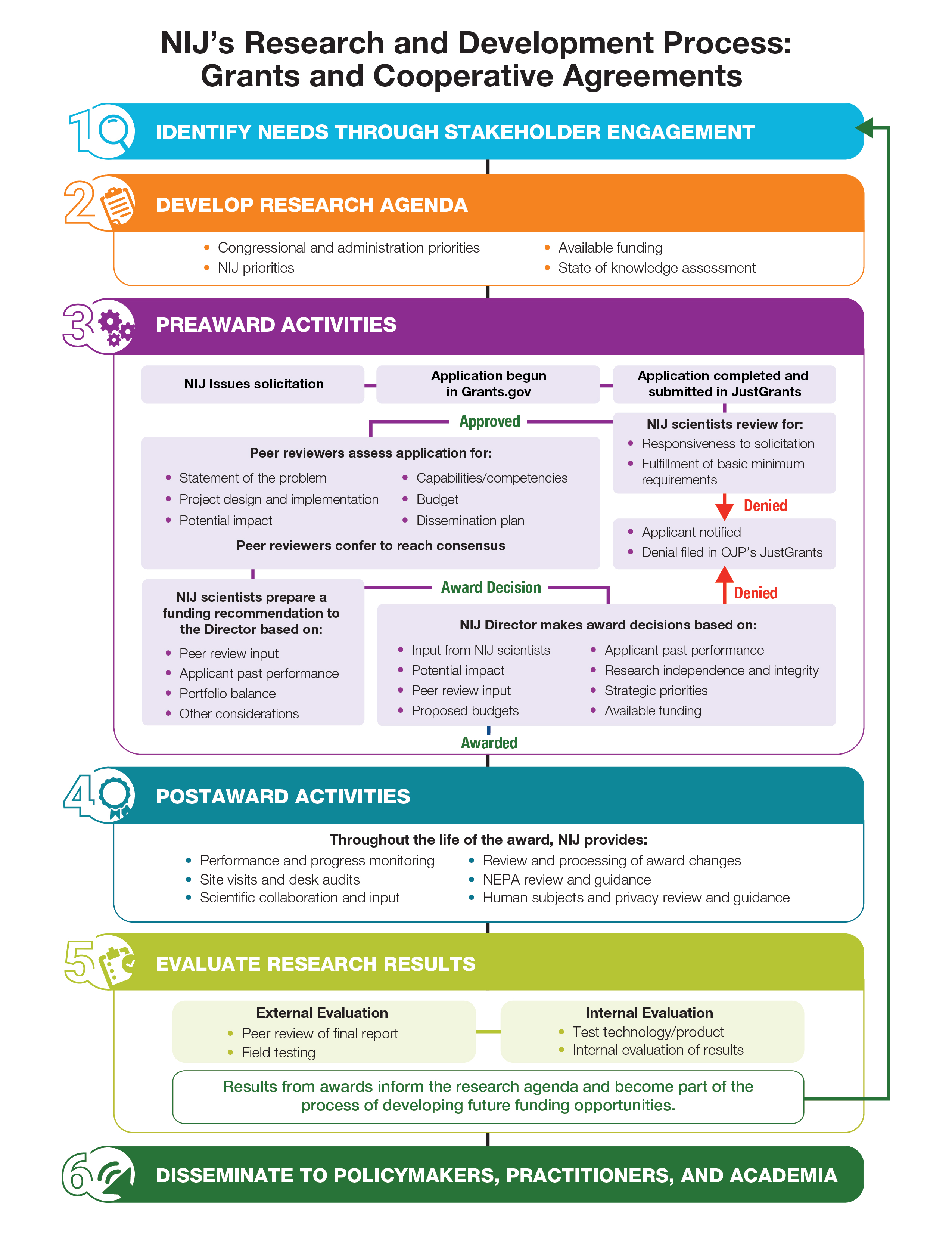NIJ’s research and development process helps ensure that projects are relevant to the field and produce valid, actionable results. The process typically includes:
Throughout this process, we follow widely accepted scientific processes and procedures to help ensure the validity and integrity of our research. Learn more about research validity and integrity at NIJ.
We identify the needs of criminal justice fields through engagement with practitioners, policymakers and researchers.
We sponsor meetings, workshops and working groups that generate a rich exchange of ideas. These events guide future research and help ensure that our research, development and evaluation activities meet real-world needs. Review the summaries and transcripts from many of these meetings.
We also fund a collaborative research effort to assess and prioritize technology needs across the criminal justice community. Learn more about this effort and read the available reports.
Our long-term research agenda is guided by our strategic goals. At the heart of our research planning process is the need to build on current science while balancing long-term strategic research goals with the pressing needs of practitioners and policymakers. Learn more about our strategic challenges and research agenda.
We uses two main mechanisms to implement research: funding external research and conducting intramural research.
External Research. Each year, NIJ solicits proposals that respond to our research agenda. We look for ideas that are likely to generate significant advances in both science and practice. Proposals are reviewed by independent peer panels composed of both researchers and practitioners from federal, state, and local agencies. After peer review panels complete their reviews, our scientists present the proposals to the NIJ Director who makes final award decisions.
Learn about our peer review process and view lists of forthcoming, current and past notices of funding opportunity, and awards made in prior fiscal years.
Intramural Research In cases where particular expertise and initiative reside within NIJ, our science staff may work independently or in collaboration with other scientists or experts from other organizations. Our intramural research program supplements our extramural research program and helps ensure the continuous and efficient fulfillment of our mission. It also complements, advances and informs extramural research efforts and helps improve criminal justice policy and practice. Learn more about NIJ’s intramural research program.
After NIJ awards a grant or cooperative agreement, our science and grants management staff conduct in-depth, proactive grant monitoring activities, including on-site visits to grantee offices and project locations. Each NIJ award is assigned a grant manager who provides technical assistance and guidance to recipients. For awards made in the form of cooperative agreements, NIJ scientists work collaboratively with the awardee’s investigators on substantive issues related to the award — providing assistance, guidance, coordination and participation in project activities to ensure its success.
See resources for award recipients from the Office of Justice Programs to learn more about award monitoring and management.
The results of research projects are evaluated by external peer reviewers, NIJ’s own science staff, or both. In addition, awardees and NIJ scientists are encouraged and expected to publish results of their work in peer-reviewed journals.
When a project results in a new or revised tool or technique, it may be subjected to evaluation through external or internal field testing.
Data resulting from a research project must be submitted to National Archive of Criminal Justice Data. (There are some exceptions.) Making data available allows researchers to test each other's conclusions — verifying, refining, or refuting original findings — and develop and test new conclusions. See datasets resulting from NIJ-funded research.
NIJ-funded program evaluations also may be reviewed, rated and posted to CrimeSolutions — an NIJ-funded project that uses rigorous research to determine what works in criminal justice, juvenile justice, and crime victim services. Learn more about the program rating process on CrimeSolutions.
After NIJ has evaluated the results of the funded research, it is disseminated through multiple channels as part of our mission to (1) give policymakers and practitioners the best available evidence to make decisions and (2) build knowledge that advances both science and practice.
In addition to disseminating the findings to the field, results are used internally to further develop our programs of research and evaluation.
Several methods are available for sharing research findings. Select a link below and begin looking for answers:


